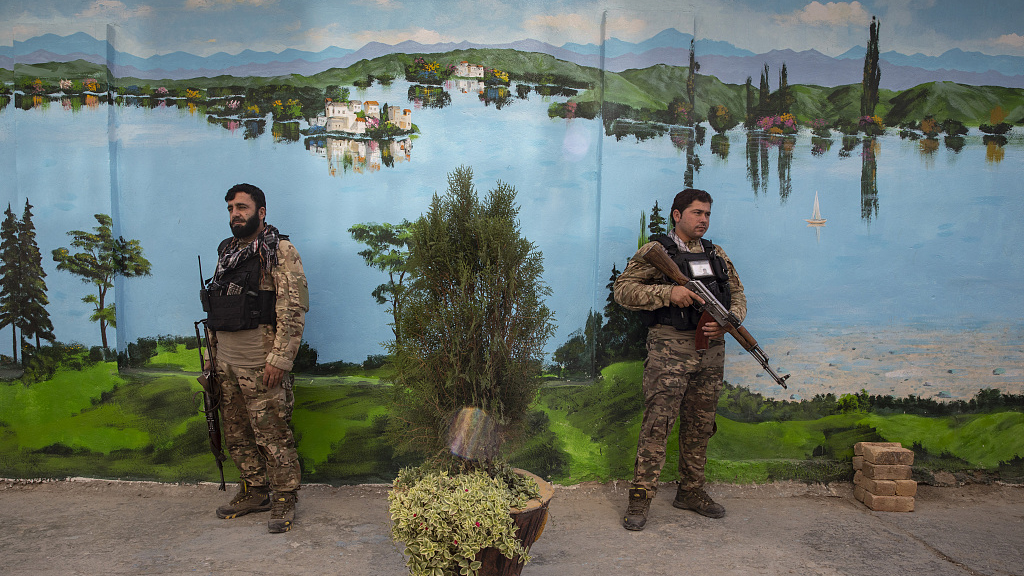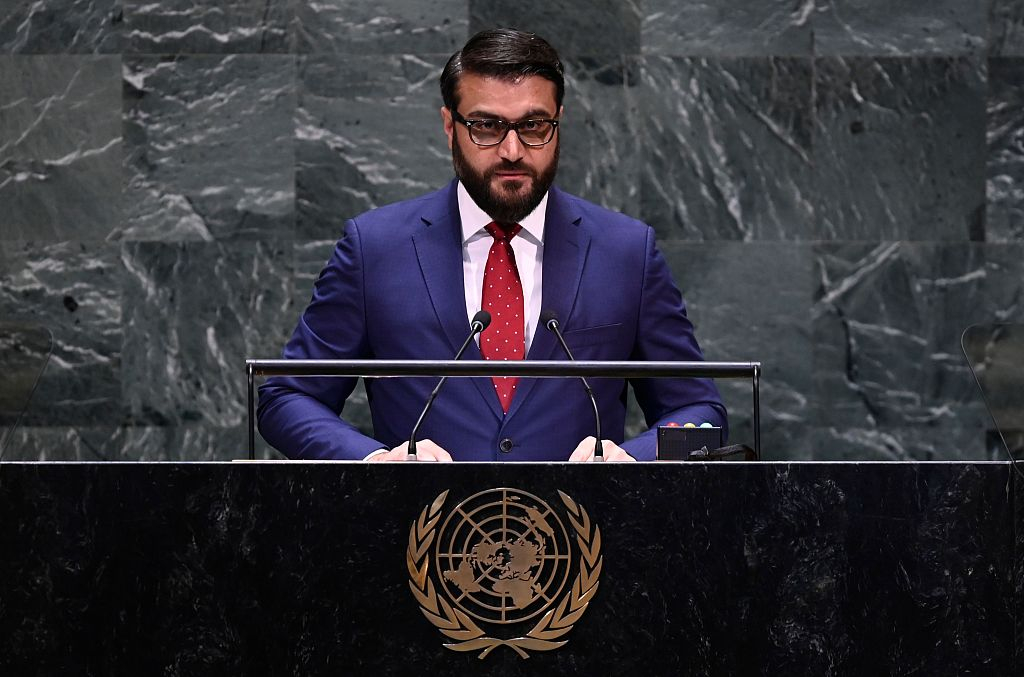
Afghan security patrols stand by a mural showing a picturesque European village outside a municipal building on September 29, 2019 in Kabul, Afghanistan. /VCG Photo
Afghan security patrols stand by a mural showing a picturesque European village outside a municipal building on September 29, 2019 in Kabul, Afghanistan. /VCG Photo
Editor's note: Kulbhushan Warikoo is a former professor at the Centre for Inner Asian Studies, School of Internatkonal Studies, Jawaharlal Nehru University, New Delhi. He is currently a senior fellow of the Nehru Memorial Museum & Library, New Delhi. The article reflects the author's opinions, and not necessarily the views of CGTN.
Even though the war against terror in Afghanistan was launched over 18 years ago, many basic freedoms – from insecurity, fear and poverty are yet to be achieved. The battle between the forces of democratization and those of destabilization in post-Taliban Afghanistan is at its peak.
Reports of ambushes, killings and bomb explosions across Afghanistan have been reported almost daily. The threat to security in Afghanistan is from the attacks by the resurgent Taliban and of late by ISIL extremists. The 24th Report of the Analytical Support and Sanctions Monitoring Team submitted to the UN Security Council in July stated that "Al-Qaida considers Afghanistan a continuing safe haven for its leadership relying on its long-standing and strong relationship with the Taliban leadership. Al-Qaida continues to cooperate with Lashkar-e-Tayyiba and the Haqqani network. Al-Qaida members continue to function routinely as military and religious instructors for the Taliban."
Before U.S. President Donald Trump abruptly canceled a secret David Camp meeting with Afghan President Ashraf Ghani and Taliban leaders last month, declaring the peace talks were "dead," both the U.S. and Taliban had once claimed to be making progress in the peace deal. However, even during the peace talk there had been steep rise in attacks across Afghanistan, with over 1,500 people killed or injured in July 2019 alone.
The year 2018 witnessed an 11 percent increase in civilian deaths as compared to that in 2017. As the UN report on human rights situation in Afghanistan released in January pointed out that "The year 2018 began with two major attacks in Kabul alone and in Jalalabad resulting in 143 civilian deaths and 265 injured between 20 and 27 January 2018."
The Taliban are desperately working to undermine the state and create chaos and instability in Afghanistan. They have actually escalated the conflict by carrying out several deadly attacks, killing hundreds of civilians and security personnel. The Taliban targeted schools and mosques during the election period to disrupt and undermine the electoral process.

Hamdullah Mohib, Chair of the Delegation of Afghanistan speaks during General debate of the 74th session of the UN General Assembly on September 30, 2019 at the United Nations Headquarters in New York City. /VCG Photo
Hamdullah Mohib, Chair of the Delegation of Afghanistan speaks during General debate of the 74th session of the UN General Assembly on September 30, 2019 at the United Nations Headquarters in New York City. /VCG Photo
The international community needs to shed its ambivalence and evolve a concerted strategy to curb terrorism and extremism in and around Afghanistan by stopping their sources of funds, arms, logistics and training and ideological motivation.
The reconstruction of collapsed social and economic infrastructure and development of Afghanistan as the transit hub of regional trade and traffic, will help in putting the social and economic situation in Afghanistan back on tracks, though the process is cumbersome and long drawn. Intra-Afghan peace and consensus among various Afghan groups/stake holders is the sine qua non for lasting peace and stability.
Any attempts at peace and reconciliation should not be rushed and should preserve the constitutional process and other gains of the last 18 years. It should also ensure independence, sovereignty and territorial integrity of Afghanistan. Such process should be based on principles of shunning violence and severing ties with international terror networks; accepting the Afghan Constitution; and honoring the rights of weaker sections of Afghan society, ethnic-religious minorities, women and children.
While the peace process should be aimed at engaging and bringing together all the Afghan groups, it should isolate the extremist and terrorist networks which are bent upon recreating the Caliphate/Emirate in Afghanistan. During their talks with the Afghan politicians including former president Hamid Karzai at Moscow in February 2019, the head of the Taliban delegation Mohammad Abbas Stanikzai emphatically rejected the Kabul government constitution as invalid and demanded an Islamic constitution to be drafted by Islamic scholars. So ensuring sustainable security and peace in Afghanistan is a great challenge facing the international community.
International agencies like the United Nations, World Bank and European Union need to implement the reconstruction programs, employing professional and committed cadres in coordination with the local agencies/personnel.
The future of Afghanistan with guarantees of peace, security and well-being of its people hinges upon the success of reconciliation between rival ethnic/regional Afghan political groups and commanders, emergence of a balanced and broad-based stable government representing diverse ethnic, regional and minority interests.
It also involves the setting up and effective functioning of law enforcement agencies, strengthening the Afghan National Defense and Security Forces by having a robust vetting process in place to prevent members of armed groups involved in crimes from being recruited by security or government institutions, on the speedy implementation of reconstruction of social, economic and education infrastructure, and on elimination of drugs and arms trafficking from Afghanistan.
(If you want to contribute and have specific expertise, please contact us at opinions@cgtn.com.)